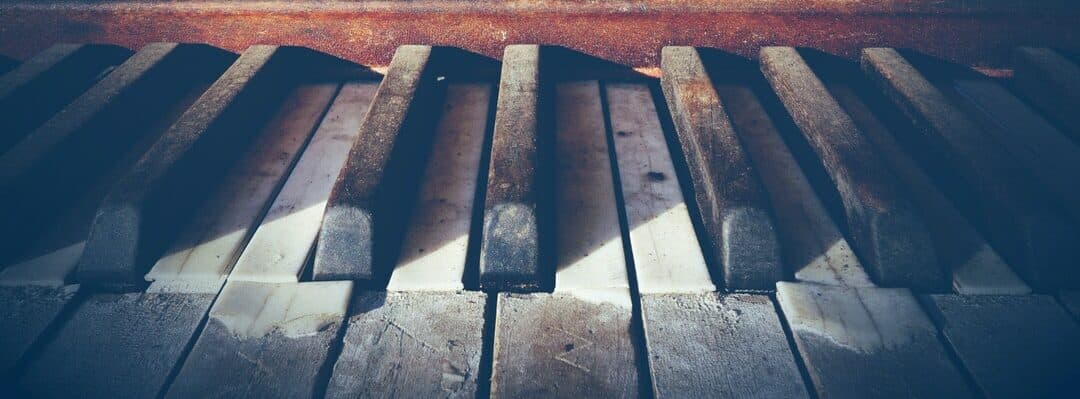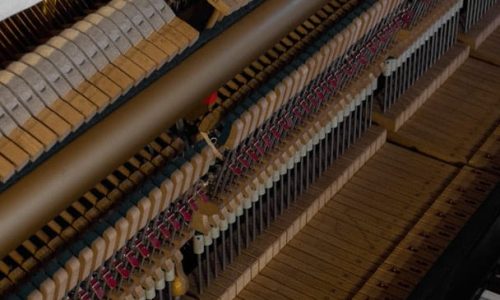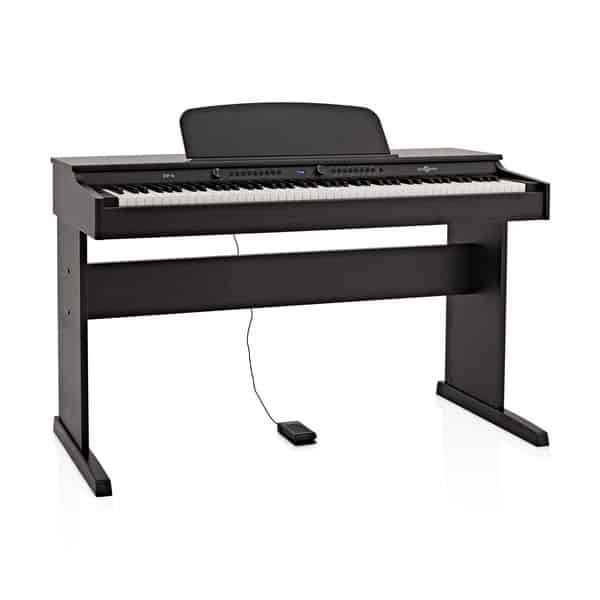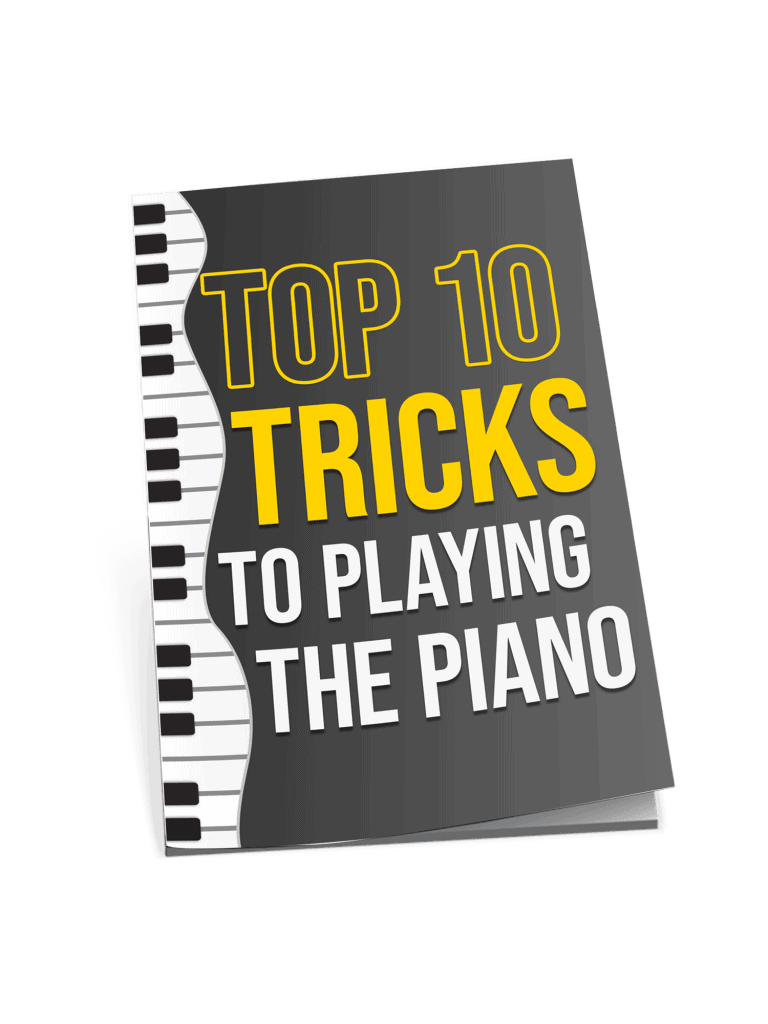Best
BUDGET DIGITAL Piano
-
Overall: An Entry Level Instrument For Pianists Starting Their Piano Journey
-
Best Feature: Duet/Dual/Split Modes; 64-Note Polyphony; In-Built 2-Track Recorder; Built In Metronome
-
TedScore™: 9/10
Best
INTERMEDIATE Digital Piano
-
Overall: Those Who Want A Realistic Feel That Is Provided By The Progressive Hammer Action Keyboard
-
Best Feature: SuperNATURAL Roland Sound Modelling For Authentic Acoustic Piano Sound
-
TedScore™: 9/10
Best
ADVANCED DIGITAL Piano
-
Overall: People Who Have A Very Healthy Budget, Or Want The Most Realistic Playing Experience
-
Best Feature: Incredible Sound Quality, Including Samples From The Yamaha CFX And The Bösendorfer Imperial
-
TedScore™: 10/10
Welcome to the **Piano Buying Guide**. **Need tips** on picking **acoustic pianos** (upright or grand)? Searching for **unbiased digital piano reviews**? Look no further; all the **details** are here!
Our job is to review the best-rated instruments on the piano market that might match your preferences and share tips and tricks so you can buy a piano that’s perfect for you. We’ll also give you a little advice if you’re looking to purchase a used or second-hand piano.
So let’s get into the details.
Things to Consider When Buying a Piano Online
Budget
Pianos are a pricy investment. If your budget is limited, you can search for a good second-hand piano, but you have to be careful – there is a lot of trash out there!
Set yourself a budget; think about how much you would like to spend on a piano to determine whether to purchase a brand-new or a second-hand one.
High-quality upright pianos’ prices range from around £/$4,000 upwards, while grand pianos are the most expensive option at prices from 20,000 to 80,000 (and above, depending on the brand).
Digital pianos are the most common type of piano you can find at affordable prices. They usually range from 300 to 5,000.
New vs second hand

A new acoustic piano might be a brilliant idea since its lifespan can reach upwards of 80 years. With a new piano, you ensure everything works properly and is covered by a few-years warranty. However, its price will always be higher than second-hand pianos – and in my opinion, it’s worth it for the security.
But one word of caution, never purchase a used digital piano. It’s just not worth the risk. They are essentially computers, and it’s always best to have the warranty from a new instrument.
Acoustic piano or digital pianos
Acoustic and digital pianos both fundamentally do the same thing, but they do things in very different ways! If you’re interested, here is a dedicated article on the topic.
Acoustic pianos have over 10,000 moving parts, including hammers that hit strings, which vibrate producing a sound. They require more space, good room temperature, and consistent tuning. An acoustic piano is a pricier option but has a longer lifespan.
There is also no substitution for a real acoustic piano – eventually, as you progress, you’ll absolutely want an upright or grand. But a digital piano is a great option if you’re a beginner.
Digital pianos have weighted keys, you can usually alter the keys’ sensitivity and volume, and of course, play with headphones to not disturb others.
When purchasing a digital piano, you’ll want the following set of minimum features if you’re looking at the console or portable digital pianos:
- A piano action that is at least semi-weighted keys, but preferably fully weighted keys (sometimes called hammer action keys)
- Number of keys = 88 keys
- Sturdy keyboard stand
- Adjustable piano stool (sometimes called a piano bench)
- Decent set of headphones (look at our article Different Types Of Headphones for more advice on that)
- At least a sustain pedal
All in all, digital pianos are fab instruments for beginners. And here is our list of the 24 best Digital Pianos on the market.
Grand piano or upright piano

Grand pianos are the largest and most expensive piano types. Some people consider them an item of furniture, which in our opinion, is a great shame! These pianos offer rich resonance, responsive touch, a wide dynamic range, and diverse tonality.
They also come in different sizes, like Baby Grand and Concert Grand piano models. Baby Grand is the smallest, and there are many sizes above that, eventually reaching a 9 foot Concert Grand, designed (as the name suggests!) for concert halls.
Grand pianos are big and take up a lot of space, but are a gift for advanced players.
Acoustic upright pianos are more compact and less expensive compared to grand pianos. Upright pianos are an excellent option if you need a space-saving piano at an affordable price range. An upright is usually the ‘standard’ acoustic in a home.
Click here to see a dedicated article discussing a grand piano vs an upright piano.
In terms of brands, you can’t go wrong with a Kawai, Yamaha or a Steinway piano. Yamaha tend to be a little lighter to play, and Steinways feel heavier.
Some piano brands produce silent pianos (sometimes called hybrid pianos). They are real acoustic pianos, that can also turn into a type digital piano, where the hammers are deactivated, and you can play with headphones. There are not so many choices of these instruments, and they are expensive. They can however, be great options for those needing to be able to play an acoustic and also do silent practice.
What to Look For When Buying a Second-Hand Piano Online
Most people opt for used acoustic pianos because they are a budget-friendly option. Let’s see what to look for when buying used pianos.
Condition of the keys
The keys and the whole keyboard are the first things to note. By checking the piano keys and keyboard condition, you can determine whether or not the previous owner was taking care of the piano.
Oh, and obviously, only buy an instrument with 88 keys.

Are they dirty or chipped?
Dirty and chipped piano keys point to the owner not caring for its condition. Stained keys are big warning signs.
Also, discolored keys signify that the piano was exposed to moisture, cigarette smoke, or cooking grease. Dirty keys aren’t a big red flag, but they might help you decrease the price.
Are any keys missing or out of line?
Check the seller’s photos and determine whether the keys are all levelled or uneven. If you notice that some keys are lower than others, it might result from moth damage on the cloth. Stay away from these instruments.
Also, if the piano is not well-maintained, a woodworm might damage the construction and make holes under the keys.
If any of the keys are missing, run like the wind!
Condition of the piano casing

Check the piano case and determine whether it leaves good first impressions. If there are visible scratches or broken and loose parts, negotiate hard.
A scratched and faded finish might not affect the playability, but it points to the fact of how well the owner cared for the piano.
If you can see the piano in person, we recommend inspecting the casing in detail and smelling the piano. An unpleasant smell points to the mould accumulations caused by the humidity of the room where the piano was kept. Avoid these instruments.
Cracks in the soundboard

If the seller has provided interior photos, you should check the soundboard, which is the flat wooden panel behind the strings. Check if the soundboard is in good condition or if there are some cracks.
Soundboard cracks will seriously damage the tone and tuning stability. Avoid.
Rusty strings

Rusty strings are caused by moisture. This automatically means the owner kept the piano in a humid room, another example of bad maintenance.
Rust can be removed, but not in every case. However, piano strings can be a very delicate, so it is best to find a piano in a better condition rather than buying one that needs a lot of repairs.
Obtain a full history of the piano
If purchasing a second-hand piano, you need to obtain a full history. This needs to include:
Age of the piano
Every piano has a lifespan. Knowing the year of manufacturing will tell you a lot about the piano, its construction, features, and the condition it might be in right now. You should ask for more historical details about the piano, especially if it is pricey.
An older piano doesn’t necessarily indicate a bad piano; it just means you have to be a little more careful.
Number of owners
How many owners has the piano had? One or two is fine – but any more than that, and I’d caution against buying that instrument.
Tuning history
Best Piano Types
Digital piano reviews

BEST FOR: An entry level instrument for pianists starting their piano journey
FEATURES: Duet/Dual/Split modes; 64-note polyphony; in-built 2-track recorder; built in metronome
DP-6 Digital Piano by Gear4music
When you check the price above, you’ll see there are loads of great places to buy this item. Our personal favorite is Gear4music.
It is the largest music retailer in the UK and fast becoming the most respected online music shop in the US too. Their customer service is excellent, they have competitive prices, really fast shipping, and usually have the longest guarantee.
Most professional musicians use Gear4music, so there is no reason why you shouldn’t too!
- Fun instrument effects and sounds
- Eight different chorus types
- Four touch responses
- Super value for money
- Included sustain pedal
- No piano bench included
- The included headphones are not of a high quality
- You'll outgrow the instrument when you become an intermediate player
The professional musician who wrote this article combined many things,
from the product build, manufacturer’s reputation through to feedback
from other users, to create our famous TedScore™.

BEST FOR: Those who want A Realistic Feel that Is Provided By The Progressive Hammer Action Keyboard
FEATURES: SuperNATURAL Roland Sound Modelling For Authentic Acoustic Piano Sound
ROLAND DP603
When you check the price above, you’ll see there are loads of great places to buy this item. Our personal favorite is Gear4music.
It is the largest music retailer in the UK and fast becoming the most respected online music shop in the US too. Their customer service is excellent, they have competitive prices, really fast shipping, and usually have the longest guarantee.
Most professional musicians use Gear4music, so there is no reason why you shouldn’t too!
- An excellent-looking instrument
- Great connectivity and great sound quality
- The longest warranty in the class
- There are other pianos on the market that are a little more pleasant to play
The professional musician who wrote this article combined many things,
from the product build, manufacturer’s reputation through to feedback
from other users, to create our famous TedScore™.

BEST FOR: People who have a very healthy budget, or want the most realistic playing experience
FEATURES:Incredible Sound Quality, including samples from The Yamaha CFX And The Bösendorfer Imperial
YAMAHA AVANTGRAND N1X
When you check the price above, you’ll see there are loads of great places to buy this item. Our personal favorite is Gear4music.
It is the largest music retailer in the UK and fast becoming the most respected online music shop in the US too. Their customer service is excellent, they have competitive prices, really fast shipping, and usually have the longest guarantee.
Most professional musicians use Gear4music, so there is no reason why you shouldn’t too!
- Simply the finest and most lifelike representations of real grand pianos on the market
- A high-quality construction
- The most realistic playing experience of any digital instrument
- Realistic acoustic piano action
- Perfect for classical pianists
- The cost is quite high, yet I would argue that you get what you pay for!
- It's enormous, so you'll need plenty of room
The professional musician who wrote this article combined many things,
from the product build, manufacturer’s reputation through to feedback
from other users, to create our famous TedScore™.
Upright piano reviews

BEST FOR: Absolutely everyone. Professional experienced pianists through to beginners will love this instrument.
FEATURES: The choice of 8 different colors, standard 3 pedals, and a brilliant 121cm height
YAMAHA U1
When you check the price above, you’ll see there are loads of great places to buy this item. Our personal favorite is Gear4music.
It is the largest music retailer in the UK and fast becoming the most respected online music shop in the US too. Their customer service is excellent, they have competitive prices, really fast shipping, and usually have the longest guarantee.
Most professional musicians use Gear4music, so there is no reason why you shouldn’t too!
- Wonderful sounding piano
- Superb dynamic range
- Built like a tank so will last years
- Holds its tuning well
- At the pricier end of upright pianos, but worth it
The professional musician who wrote this article combined many things,
from the product build, manufacturer’s reputation through to feedback
from other users, to create our famous TedScore™.
Grand piano reviews

BEST FOR: Home use or a very small performance space
FEATURES: A length of 186 cm
Yamaha C 3 X PE
When you check the price above, you’ll see there are loads of great places to buy this item. Our personal favorite is Gear4music.
It is the largest music retailer in the UK and fast becoming the most respected online music shop in the US too. Their customer service is excellent, they have competitive prices, really fast shipping, and usually have the longest guarantee.
Most professional musicians use Gear4music, so there is no reason why you shouldn’t too!
- CS series is designed to 'sing' well
- Beautiful rich tone
- One of the best pianos in the world. Some would say the perfect instrument!
- Towards the top end of the Yamaha range, so not cheap
The professional musician who wrote this article combined many things,
from the product build, manufacturer’s reputation through to feedback
from other users, to create our famous TedScore™.
What to Look For When Buying a New Piano Online
Buy from a trusted source
Purchasing pianos online is much easier, but it is not completely safe. When buying online, you must first ensure that the chosen store is trusted, reliable, and transparent. Check for customer reviews and ensure they are authentic and written by real customers.
Another thing that characterizes trusted instrument stores is the refund guarantee and warranty. The refund policy will make you feel more secure to return the product if it doesn’t meet its description.
Our recommended and trusted online shops
Gear4music is our top trusted online instrument store with a wide-long offer of great instruments.
The reason why we rely on this store is because of its transparency, customer-friendly policies, exceptional offers, and high-rated customer feedback. Plus, they offer unbeatable guarantees.
There are of course other music stores to use, which may also be perfectly acceptable. Just do your homework.
Check reviews of the piano
Checking customer reviews is an important thing to consider before placing your order. Once you choose the right instrument, scroll down and check what people think about it and whether they recommend a better option.
If unsure, go for trusted brands of instrument
If you still feel skeptical, buy a piano from one of the main manufacturers. They’ve spend millions on research and development, and that’s why they can charge the prices they do.
Does the Seller Provide a Warranty?
Buying a piano is a big investment. Whether you choose an ultra-expensive or cheaper one, the seller should provide you with a warranty.
Most retail stores provide two to three years of warranty coverage, while our chosen Gear4music has an option for an additional warranty period of five to 10 years, depending on the brand and model.
Never buy a piano or other instruments without a warranty. Some stores might sell fake products made of cheap materials and only get your money without giving you value for money.
The warranty guarantees that the product you purchase will have no defects or other issues in the next few years.
Things to consider when buying an acoustic piano
Use a Professional Piano Moving Service
If you need to move an acoustic piano, don’t even think about doing it yourself! Professional piano moving services are equipped with vehicles and people who have experience in moving these heavy and expensive instruments.
It might be costly, but believe us, it is worth every penny.
Tuning the Piano
You only need to tune acoustic pianos.
The general recommendation for number of tunings are two times a year, but it might be more if you keep the piano in a humid room.
However, when buying a brand-new or second-hand piano, you should tune it at least four times in the first year. This will help you adjust the piano to the new temperatures and environment.
Digital pianos have an electronic keyboards that do not need to be tuned.
Buying Piano Guide
Summary
Piano playing can be a life-long skill; therefore, a piano can be a life-long companion. So buying a piano is not a decision to be made lightly.
Firstly, digital vs acoustic – which option are you going for?
If you’re a complete beginner through to an intermediate player, a digital keyboard will be just right for you. If you’re an intermediate to advanced player, you’ll probably want an acoustic, but perhaps also a digital to play in unsociable hours. It slightly depends on how much space you have!
If it’s an acoustic piano you’re looking for, do you have space and the budget for a grand piano, or are you looking at an upright?
If it’s digital keyboards you’re interested in, start with how much cash you’re willing to spend, and then choose the best piano in your price range. Remember, our list of top 24 digital pianos is a great resource if you need it.
It all sounds a little complicated, but once you whittle down the choices, it’s not!
If you need any assistance, feel free to comment below.
Good luck with your search!
FAQ's
You’re looking to buy a piano. The first question is, do you get a new acoustic or digital piano?Then check the piano shop’s reliability, piano’s features, size, price, portability, sounds, and whether it comes with included accessories. Make sure it has 88 keys, and it comes with pedals. Also, check if the store provides a warranty and a refund policy.
If you’re looking to buy a used piano, be cautious, especially online. Pay attention to the uploaded photos of the seller and ask for more if needed.
Most keyboards come with semi weighted keys as a minimum. But you’ll have to decide if you want a portable instrument (with a removable stand), or a console that looks more like a real acoustic piano.
Lastly, don’t forget you’ll need a piano bench or stool. Get a height adjustable one – that bit is non negotiable!
Beginners who have just started taking lessons should initially decide whether to buy an acoustic piano (sometimes called a real piano) or digital piano (sometimes called an electronic keyboard or a digital keyboard).
However, the best choice as a beginner pianist, will be either a digital piano or an upright piano. You can find many good-quality digital pianos at an affordable price.
Baby grands are instruments we generally avoid. Save money and get a really great upright instead.
If you need more advice, comment below, or get some piano lessons and ask your music teacher.
Keyboard instruments, like pianos, appear in various types. The main things that affect the price ranges of most pianos are the brand, year of manufacture, type, size, material quality, and sound quality.
- Digital piano – 200 to 5,000
- Upright piano – 2,000 to 25,000
- Grand piano – 10,000 to 80,000+
- Baby grand – 10,000 to 30,000
These are the average prices for brand-new, middle-class brand pianos. If you need something cheaper, you can opt for a second-hand piano. A second-hand piano in good condition might be a good deal for beginners with a limited budget.
How much you should spend on your first piano depends on your budget and piano type. In general, if you are interested in buying a digital piano, most piano teachers advise that it’s a smart idea to spend from 500 to 1,000. You are just starting your piano journey after all!
A digital piano is a good option for beginners (and especially children) to learn piano, since it doesn’t require maintenance as acoustic pianos do. Most digital pianos have an affordable price that most people can afford.
Hop down to your local store, or get suggestions from our article 24 Weighted 88 Key Digital Pianos.
Generally, a well-made digital piano can last for 10-20 years or more with proper care and maintenance. However, some lower-end models may have a shorter lifespan. It’s important to regularly clean and maintain your digital piano to ensure it lasts as long as possible.












Been debating between a keyboard and a proper piano for songwriting. This article leans heavily towards true pianos but does make a strong case for the investment in terms of quality and longevity.
It’s fascinating to see the aesthetic and practical considerations of integrating a piano into one’s living space. Digital pianos afford flexibility, but nothing beats the statement piece of a grand or upright acoustic in a well-thought-out room.
The digital piano technology has genuinely evolved, offering weighted keys and realistic sound samples. It’s a win for musicians with limited space.
i got to ask, for someone just starting n looking for the calm music brings, would a digital piano cut it? or is the real deal the way to go for that authentic feel?
Absolutely adore the variety and depth this article offers. It’s more than just buying a piano; it’s about matching your lifestyle, space, and commitment levels to the right instrument. Digital pianos seem like a good start for someone like me!
This article serves as a solid primer for buying pianos. However, I believe the tactile experience and personal preference play such critical roles in choosing the right piano, which can be challenging to gauge online.
It’s important to understand the nuances between different piano types. I’ve played on both grands and uprights, and each offers a distinct touch and sound. Testing as much as possible before buying is key, even if you’re looking online first.
Kudos for discussing moving services for acoustic pianos. People often overlook the logistics, and it can really affect your decision, especially in tight living spaces.
Interesting points on digital vs. acoustic for beginners. As a parent, I’m leaning towards digital for its volume control and headphone options. Would love to hear others’ experiences.
Grand pianos have such an allure, don’t they? The article does a good job of breaking down what to look for, but there’s just something about experiencing a grand piano in person that online shopping can’t match.